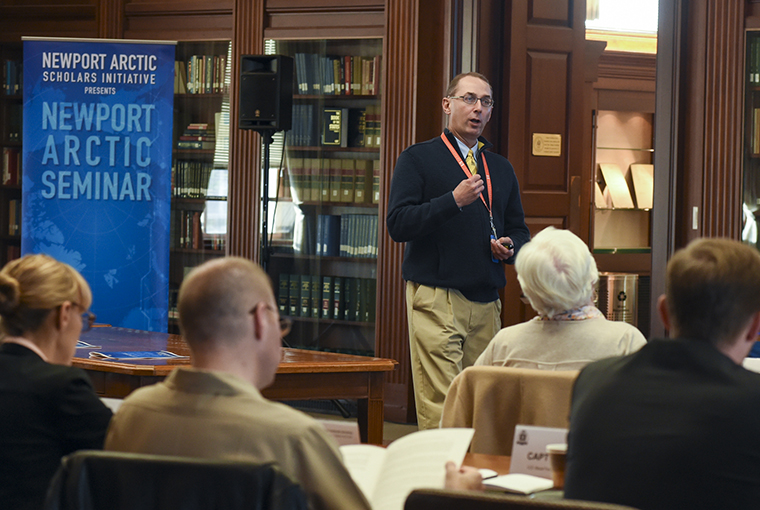Q&A with professor Jim Holmes on writing: How does a full-time professor manage to publish an article per week?


(U.S. Navy photo by Jaima Fogg/released)
Professor James Holmes has written an estimated 50 published articles in 2018, with his analysis appearing regularly in National Interest, Foreign Policy and the U.S. Naval Institute's Proceedings magazine.
He’s a master of offbeat angles and provocative takes on world events. Editors love him and gobble up his prose.
It makes one wonder: How does Holmes keep it up—in addition to the teaching load of a full-time U.S. Naval War College professor?
Q: Where do you write—home? the office?—and what time of day?
A: Not in the office, but most anywhere else and any other time. The habit of working in short bursts helps.
I had the good fortune to serve as full-time dad for about four years and learned to write in small increments—during naps, play dates, and the other small bits of leisure you get as a parent. That saw me through my dissertation, into newspaper work, and back into academic life starting at the University of Georgia.
Now that you always have a device nearby that has internet and word-processing capability, and now that a document syncs up among all of those devices, it's easy to use odd intervals of time productively. For instance, I hike several miles a day along Narragansett Bay and manage to do a fair amount of writing or editing on the iPhone while doing so. I would guess I did a third or more of the work on the new “Red Star Over the Pacific” book while traipsing around town. Articles are even easier because they're shorter.
Q: What prompts you to start an article on a particular subject?
A: Some event in the news echoes with something in my memory banks from history, philosophy, strategic theory, the sciences, fiction or pop culture. Readers really eat up an offbeat take on diplomacy, strategy or war. It helps them look at things through a lens they might not otherwise think to hold up to make sense of daily events.
Q: Do you have rules for yourself? Like, I won't write more than 500/1,000 words for an article. Or, I won't spend more than two hours a day on articles.
A: No, you can't make arbitrary rules about length. Newspapers generally impose very strict and low word counts—700 words is a good rule of thumb. But academic and professional journals also have word limits. Bottom line, you have to know and abide by the editor's requirements or risk having your work cast into the dustbin.
As far as time goes, no fixed rules there either. You do have to keep things in proportion over time. For example, for a while I was the defense columnist for The Diplomat in Tokyo and then for Real Clear Defense. They expected two pieces per week. The pace was doable, but I gave up those gigs after a few years because I noticed I was no longer reading in the evenings or on weekends. It was all writing or the day job, all the time. That's a dangerous thing.
When the pace of output is too hectic for too long, you expend mental capital without replenishing it. So I made a conscious effort to slow down, and now I think I've found my sustainable rate of production. I just finished Chernow's biography of Grant and am working through Roberts's biography of Churchill, so replenishment has resumed.
Q: How long have you been this prolific? What prompted you to start writing so much for journals and etc?
A: I first published 20 years ago this month, but I would date this phase to 2001 when we moved to Athens, Georgia for my wife's work. When you spend your days with, say, a 2-year-old, as much fun as that is—and it is a ball, believe me—you crave activity pitched at a slightly more adult level.
So I wrote a couple of op-eds for the Athens Banner-Herald. The editor liked the material and she invited me aboard as the staff foreign-affairs columnist. That opened some doors over at the university. I started doing some editing for the university part time, then joined the staff full time, and ultimately made it onto the faculty.
So the newspaper work was always there, and over time the more scholarly work came to overlay it. That mix of outlets and formats is essential to reach a large and varied audience, which is the point of doing this.
I should also acknowledge the great good fortune of finding a co-author—without really looking—who also happened to become a good friend. Toshi Yoshihara taught here for about a decade. We became acquainted while working at a small Cambridge, Massachusetts, think tank during the late 1990s. I was developing an interest in Asia, and Toshi was developing an interest in sea power. We taught each other. That partnership has endured all these years even though we haven't always been geographically co-located.
You can get lazy when it's just you. It's harder when you're letting someone else down. Toshi and I happened into a healthy incentive structure by chance, not out of any grand design.
Q: What do you give up, to be able to devote time to writing?
A: There are opportunity costs to everything you do in life. You tote up what you might otherwise spend that time and effort on, determine whether the trade-offs are worthwhile, and proceed. Or not.
